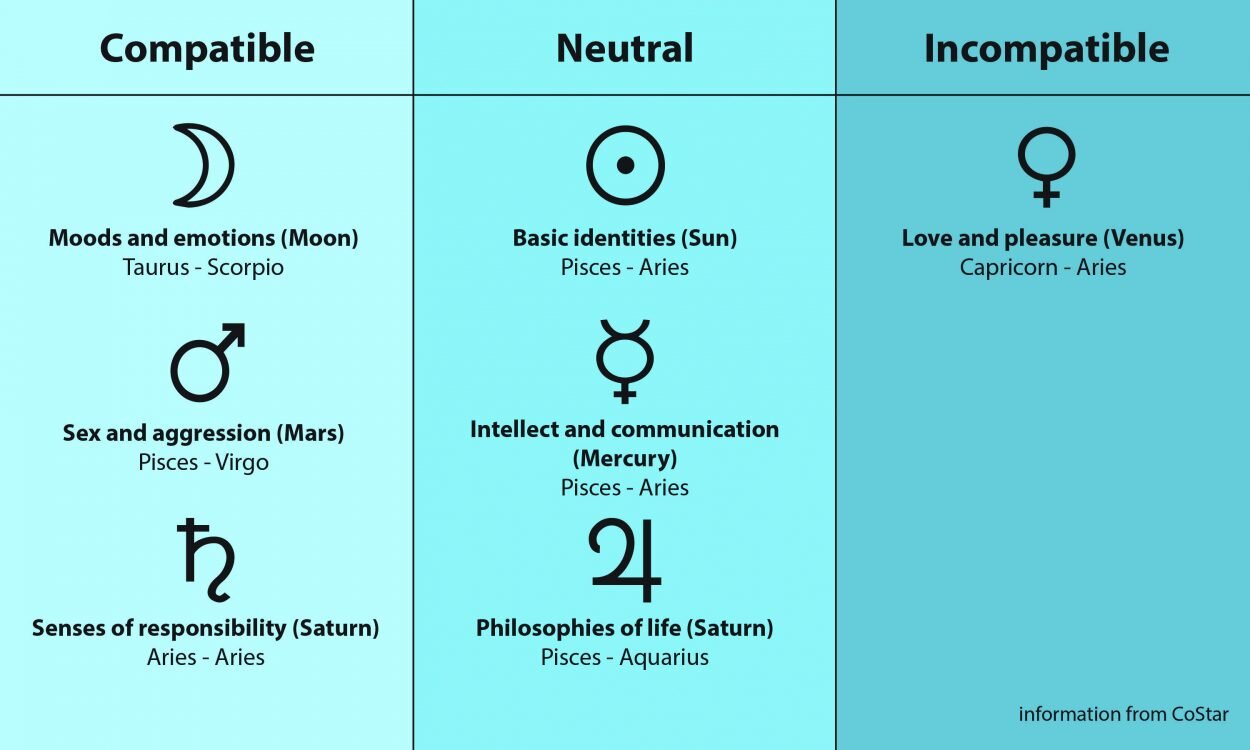Look to the stars: Why some are turning to astrology for relationship help
Some are looking to the sky for relationship help. Google Trends showed a significant spike in searches for “astrological compatibility” from 2017, hitting an all-time high this month. Graphic by Emma Reith
The question that astrologer Lindy Burke, owner of Lindy Burke Stargazer in Santa Ana, gets asked the most about dating and relationships is, “What is the best sign for me to date?” But the answer to that question, Burke said, isn’t so simple.
“There are so many factors in your chart that your sun sign isn’t the best sign to base that off of,” Burke said.
According to the popular astrology website CafeAstrology, zodiac compatibility is the idea that people are inherently more likely to get along with certain zodiac sun signs than others. The zodiac signs that correlate with Venus, the planet of love, and Mars, the planet of aggression, which the website said can also reveal a lot about how a person approaches love and dating.
“Compatibility doesn’t mean you’re gonna have a perfect relationship,” said Ella Hardy, a sophomore screenwriting major who follows astrology. “You are also where you come from and your experiences shape who you are.”
Searches for the term “astrological compatibility” have spiked significantly since 2017, hitting an all-time high this month, according to Google Trends.
Junior television writing and production major Aaron Chen sees things a little differently. He said that he believes in astrology because everyone else does.
“I use it when I want to understand what I feel and I need direction,” Chen said. “But I don’t think it matters when it comes to relationships, because you are so much more than your sign.”
The University of Manchester conducted a study in 2007 on marriages and astrological compatibility, finding that zodiac signs had no impact on the probability of marrying and staying married to someone of another sign. But some women tend to be invested in the idea of zodiac compatibility.
Ninety percent of the women in a 2001 University of the West of England study had looked up the zodiac sign of someone they were interested in, according to the study, which focused on the effects of horoscopes on women’s relationships.
“(Astrology) lets you know the habits or proclivities of who you’re dating,” Burke said. “It gives you a heads up, because that natal sign is going to demonstrate itself somehow in the relationship.”
Fifteen percent of the women in the study said they would alter their behavior according to what they read in a horoscope.
“If I like someone, I’ll look (their zodiac sign) up,” Hardy said. “But just because two people aren’t compatible doesn’t mean they can’t work together. For one, astrology isn’t everything. And two, people are different.”
Astrology compatibility has also reached dating apps. Bumble added a filter feature in December 2018 that allows users to put their zodiac sign on their profiles and filter through the dating pool using the 12 signs.
“This trend has to do with young people choosing to identify less with religion and more with spirituality and astrology,” Jess Carbino, Bumble’s sociologist, told Well and Good.
But astrology skeptics believe the practice is more based in superstition than in science.
Rose Albrecht, a sophomore chemistry major, described astrology as making large generalizations that could apply to anyone.
“It’s essentially a confirmation bias,” Albrecht said. “I fail to see a strong correlation between when you were born and personality traits.”
The resurgence of astrology may intrigue people to seek out the meaning behind their signs and how accurately it relays the true nature of their identity. For Hardy, the obsession with astrology isn’t a fad. It’s too accurate.
“I’m really good at guessing people’s signs, part of proof for me is that I can guess and get it right,” she said. “I’ve never really been 100 percent wrong.”

